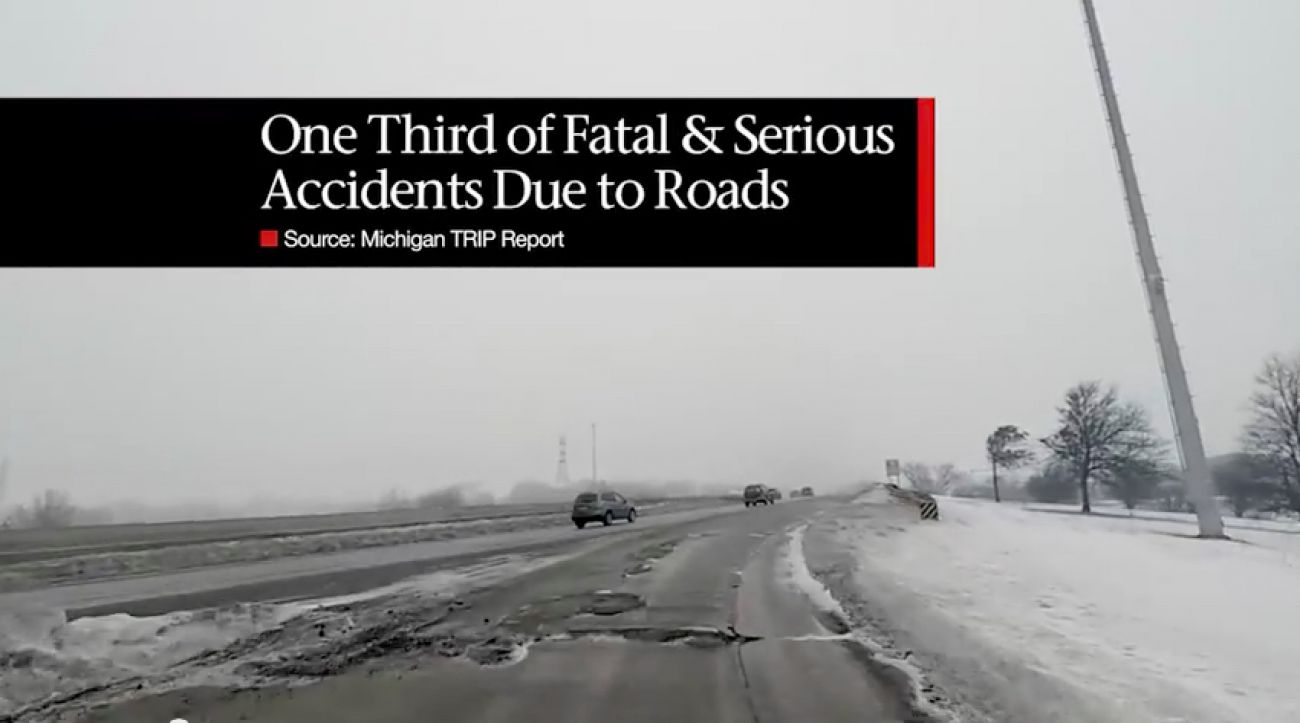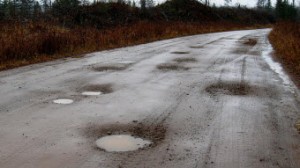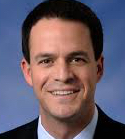With roads measure crushed, a search for Plan B

Now that Michigan voters have made roadkill of Proposal 1, legislators are back to square one in the search for consensus on fixing the roads – with no clear map among the Republican leaders who control Lansing for how to get there.
There seems but one sure bet for now: Michigan's pavement and bridges will continue to get worse and the cost to fix them will continue to mount.
Gov. Rick Snyder spoke only in generalities Tuesday after the proposal went down by roughly 4-to-1, with most county results in. He spoke of the need for “a comprehensive, long-term solution” and vowed to “work with my partners in the Legislature.”
House Speaker Kevin Cotter, R-Mt. Pleasant, took the vote as a public mandate for low taxes and a “simple solution” for fixing Michigan roads. “We will begin work immediately on addressing the road funding issue that still faces this state.”
As for Senate Majority Leader Arlan Meekhof, R-Ottawa County: “There is no specific plan at this time,” said Amber McCann, his spokesperson, before Tuesday’s vote. She noted that Meekhof had backed a 2014 measure to add $1 billion in funding that cleared the state Senate, only to die in the House, and said he is “ready to begin the discussion anew.”
While the governor insisted throughout the campaign that there was no Plan B if Proposal 1 failed, the House Speaker suggested the opposite might be true.
Gideon D'Assandro, spokesman for Cotter, said shortly before the vote that “there won't be one Plan B” if Proposal 1 loses. “There will be many Plan B's. That will make moving forward and finding a new compromise in a timely manner extremely difficult, which could delay needed repairs.”
With conventional wisdom holding that Republican legislators will be even less likely to vote for tax increase in 2015, Republican leaders may find themselves needing more help from Democrats to get a roads measure passed.
As for those Democrats, they blamed Proposal 1’s flameout on voters fed up at paying more than their fair share for road repairs. House Minority Leader Tim Greimel, D-Auburn Hills, said Snyder’s aggressive business tax cuts have stuck the middle class with too large a financial burden.
“Michigan families have sacrificed, and it’s past time corporations chip in,” Greimel said on a conference call with reporters Tuesday night. He added that voters don’t want another referendum, but expect lawmakers to “do their jobs.”
Money doesn’t talk
Tuesday’s Proposal 1 loss wasn’t for lack of money.
According to Rich Robinson of the nonprofit Michigan Campaign Finance Network, Safe Roads Yes, the committee backing the measure, raised nearly $8.7 million in support. Its chief contributor is the Michigan Infrastructure and Transportation Association, a construction trade group, which contributed $5.6 million. By contrast, three committees registered to oppose Proposal 1 raised $195,527.
Susan Demas of Inside Michigan Politics, a Lansing newsletter, foresees more political chaos ahead.
“I think the most likely scenario is the piecemeal approach to roads we've seen for years – moving some money around, but no comprehensive solution...trying to get a majority of both houses and the governor on the same page has been vexing.”
Demas noted that the Michigan Chamber of Commerce threatened to back a ballot initiative in 2014 to fund roads as a means of pressuring lawmakers to act on the issue. But the state chamber remained conspicuously neutral on Proposal 1 – citing a lack of consensus among its members.
With the failure of Proposal 1, Demas said, “I can't believe the Chamber or anyone will want to put up the money to try another tax increase.”
A statewide poll conducted last week by Lansing polling firm EPIC-MRA reflected similar divisions among the public as to what should be done. While 67 percent rated state roads as “poor,” 35 percent said that fees or taxes would have to be increased to fix them, while 37 percent said funding for roads could be raised by cutting services or programs elsewhere.
It also found that 64 percent would favor a 1-cent increase in the sales tax if it guaranteed that all funds would go to roads and bridges. Sixty-six percent opposed raising the fuel tax to pay for roads.
Interestingly, according to Bernie Porn of EPIC-MRA, it is the first time that support for a sales tax hike to pay for roads polled above 60 percent.
The plan
Proposal 1 was projected to raise about $1.2 billion in added revenue for state and local road agencies. It was also calculated to raise about $600 million a year for schools, cities, mass transit and the state general fund.
It would have hiked the state sales tax from 6 percent to 7 percent, while exempting fuel from the tax. Its passage also would have set in motion other measures to raise wholesale fuel taxes, raise registration fees for cars and trucks and restore tax credits for low-income workers.
Backers of the unwieldy measure, cobbled together in the waning hours of December's lame duck legislative session, insisted it was still the best chance to fix a road system growing worse by the year. Even so, critics on both sides of the proposal heaped scorn on legislators for passing the funding decision to residents rather than reach a deal last December.
State trunklines – all interstates and highways in Michigan – are still in OK shape. The Michigan Department of Transportation calculated that 85 percent were in good or fair condition in 2014. But that's down from 92 percent in 2008.
The deterioration is more obvious when local roads are factored in. According to the state Transportation Management Council, 38 percent of roads eligible for federal aid – which includes trunklines, primary county roads and major city streets – were in poor condition in 2014. That's more than triple the percentage in 2003, when 11 percent were rated poor.
MDOT Director Kirk Steudle said the state's trunkline system has seen an additional 1 percent or 2 percent slide into poor condition in recent years. He estimates that could rise to 6 percent or higher annually without added funds.
Michigan at bottom
According to a national survey by the Associated Press, Michigan ranked 49th of 50 states in 2013 for per capita funding for roads.
That’s tied to the fact that Michigan has relied on a flat fuel tax since 1997. According to the Senate Fiscal Agency, the 19-cent per-gallon gas tax imposed that year is now worth the equivalent of 13.5 cents because of inflation, while the amount of fuel consumed had dropped because cars are more fuel-efficient. Road construction costs have only gone up in that time.
A national study by TRIP, a Washington-D.C.-based research group, found the state's bad roads cost motorists more than $300 a year in added repair and tire wear costs, stating the roads cost a Detroit motorist $536 in extra costs and a Grand Rapids motorist $327 a year. It also found that 27 percent of state and local bridges were rated structurally deficient or functionally obsolete in 2012.
Some conservative GOP elements of the state House are rallying around an earlier plan to dedicate $1.2 billion more to roads, without raising taxes. Under legislation introduced by state Rep. Gary Glenn, R-Midland, the current 6-cent sales tax on fuel would be phased out and replaced by a comparable increase in fuel tax. Critics say the measure would drain funds from schools and cities, since most of the fuel sales tax is earmarked for the School Aid Fund and municipal revenue sharing.
It is similar to the so-called “Bolger plan” championed by former GOP House Speaker Jase Bolger. That was narrowly approved in December 2014 by the House, but never voted on in the Senate. Snyder stated at the time he had “serious reservations” about the plan, though he did not say he would veto it.
That plan assumes continued economic growth in the state would make up for the loss of funding for schools and cities. Mitch Bean, former head of the House Fiscal Agency, said at the time it would result in an $800 million annual loss to the School Aid Fund by 2020.
Lansing fiddles as roads burn
State Sen. Pat Colbeck, R-Canton, a Tea Party favorite, has suggested a series of options, including the Bolger plan, a freeze on general fund spending and saving money on road costs by privatizing some Michigan Department of Transportation services and finding a way to lower road construction material costs.
“Our focus should be on protecting working families and make sure they’re not bearing the brunt of any new revenue stream. It’s time to create a transportation system and funding mechanism that is sustainable long term – no more gimmicks.” – Sen. Jim Ananich, D-Flint
And there's yet one more idea: Tea Party Republican state Rep. Peter Lucido of Macomb County wants to use the Michigan Catastrophic Claims fund – it has an $18 billion surplus – to pay for roads. The fund is used to pay the medical costs of critically injured victims of automobile accidents.
Greimel foresees renewed Democratic opposition to anything resembling the Bolger plan, saying it “would fund roads by raising $800 million from local schools and $150 million from cities and townships.”
Senate Minority Leader Jim Ananich, D-Flint, likewise rejected anything that smacked of the Bolger plan. “None of those plans appear to be based in reality,” he said in a statement. “Frankly, if Bolger’s plan was any good, I think he would have passed it. Short-changing our schools and local police and fire is not good policy.”
“Our focus should be on protecting working families and make sure they’re not bearing the brunt of any new revenue stream. It’s time to create a transportation system and funding mechanism that is sustainable long term – no more gimmicks.”
Like lawmakers, key interest groups appear splintered over the best way forward.
While the Michigan Chamber of Commerce remained neutral on Proposal 1, the Grand Rapids Area Chamber of Commerce and Detroit Regional Chamber of Commerce backed it.
The Small Business Association of Michigan supported it. But the National Federation of Independent Business opposed it.
Meekhof, the Senate Majority Leader, said after Tuesday’s vote that the prospect of higher taxes may or may not have doomed Proposal 1. But he also suggested that Tuesday’s outcome may have been less about taxes than about voters infuriated at legislative inaction in Lansing.
The people of Michigan were sending a message, he said, “that they expect the legislature to solve this problem.”
See what new members are saying about why they donated to Bridge Michigan:
- “In order for this information to be accurate and unbiased it must be underwritten by its readers, not by special interests.” - Larry S.
- “Not many other media sources report on the topics Bridge does.” - Susan B.
- “Your journalism is outstanding and rare these days.” - Mark S.
If you want to ensure the future of nonpartisan, nonprofit Michigan journalism, please become a member today. You, too, will be asked why you donated and maybe we'll feature your quote next time!


 With the crushing of Proposal 1, it's "back to the drawing board" for an alternative to fix Michigan's transportation infrastructure.
With the crushing of Proposal 1, it's "back to the drawing board" for an alternative to fix Michigan's transportation infrastructure. GOP House Speaker Kevin Cotter
GOP House Speaker Kevin Cotter Rep. Tim Greimel is an Auburn Hills Democrat and House Minority Leader.
Rep. Tim Greimel is an Auburn Hills Democrat and House Minority Leader. Michigan Chamber of Commerce President Rich Studley. The Chamber remained neutral on Proposal 1.
Michigan Chamber of Commerce President Rich Studley. The Chamber remained neutral on Proposal 1. Rep. Gary Glenn, R-Midland
Rep. Gary Glenn, R-Midland